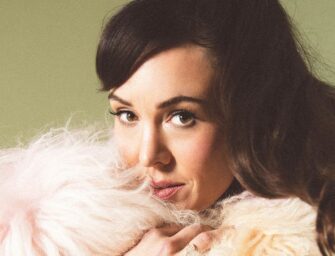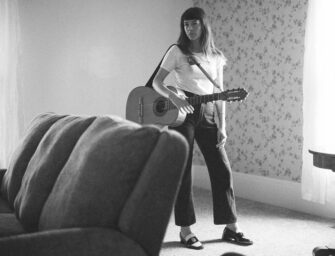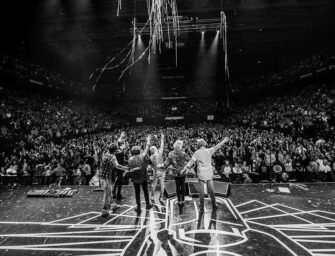
Louisa Roach: “I’m still on my own personal journey, and songwriting has become part of that.” Photo credit: Rob Blackham
The lead singer and songwriter of this uncompromising psych-pop outfit discusses the process behind her band’s new album ‘Behave Myself’
Dynamic psychedelic pop group She Drew The Gun released their subversive third album, Behave Myself, last month. It’s a record that finds the band’s lead singer and songwriter Louisa Roach on top form, creating some of her most inspiring tracks to date in the music collection. It includes songs like Class War (How Much), a punk-infused tune that addresses the corrupt nature of current political structures, and the dreamy, hypnotic composition, Diamonds in Our Eyes. The album’s lead track explores mounting rebellion with lyrics “I am the point of entanglement of oppressions interwoven/I’m the confusion of the patient, her unspoken emotion/I’m the story of all my sisters’ resistance unfolding/And I will not behave myself.”
She Drew The Gun’s previous albums, Memories Of Another Future and Revolution Of Mind, each received acclaim and set the tone for their powerful music. On Behave Myself, producer Ross Orton collaborated with Roach and fellow band members Jimmy Moon, Abbi Phillips, Lucy Styles and Jack Turner to achieve a new level of artistic freedom. Throughout, they utilize passionate lyrics and synth-heavy sounds to inspire nonconformity in listeners while remaining positive and optimistically looking towards the future.
Here, ahead of live dates early next year, Roach discusses her songwriting process and the album…
When did your interest in songwriting begin?
“I’ve always been into music since I was a kid. I’ve always been drawn to it and did musical things. But as much as I tried when I was a teenager, I never actually wrote a full song. I probably just needed some life experience. Well, for whatever reason, I didn’t write at that time in my life, and I didn’t pursue music seriously. Then, when I did go back to uni as a mature student, it was working with words all the time and writing essays, and writing about concepts about society…I think it was just working with words that kind of pulled me back to picking up a guitar and actually being able to write a song, and then once I wrote one, I was like, ‘I can actually write that. I can actually do a song.’ I eventually wrote another one. It was quite a slow process, and it kind of opened up and became more of a flood eventually.”
What does your songwriting process look like?
“It varies completely. Sometimes I’ve got songs there that I haven’t got any words for yet,… just a melody and all the chords and everything. Sometimes I just have all the words first and start like that. I think it can come from any way, and I try to stay open to have inspiration from anywhere and not having a rigid set or idea of how to write a song [and] just let it come from any direction.”
How did the pandemic affect your writing for Behave Myself?
“At first I didn’t really write. I felt like I was blocked or something. I was like, ‘Nothing’s going on here, I’m not writing at all.’ Maybe it was like my brain was just subconsciously absorbing what was going on in the world or whatever, and I just needed a little bit of time to absorb it. But then once I started writing, I did leave lots of mentions of prisons and cells and cages in the words across the album, so there are those little clues that it was written in a lockdown.
“But I don’t think it’s too much of a dark album. I think it’s quite a hopeful and joyful album, really. But there are those dark parts to it and the clues that it was written in a lockdown and a pandemic. They’re kind of just sprinkled throughout the album.”
What kind of impact do you hope the single, Behave Myself has on listeners?
“I just hope that it gets people thinking a bit…The fact that it’s making people feel a certain way is good for me. If something is evoking actual feelings in someone, then I’m doing something right. And people…say that they feel empowered when they listen to it, or it’s reminding them of a part of themselves which they have not been in touch with for a while, and it’s bringing out [or starting] rebellion. So for people to message me and say things like that, that means everything. That’s the best part about it I think.
“If it moves people, then I’m doing my job. I hope that it evokes good feelings in people. There’s enough space in the words and the song and what’s going on in that song for it to mean different things to different people. So all those things like empowerment and rebellion, if I can evoke a bit of that, then I feel good.”
Which music artists have inspired you the most?
“I’d say, first of all, the first time that I was properly moved by a song was Working Class Hero by John Lennon. I think I was like, 13, 14 or something like that. It was on at the end of a film and I rewound it loads of times so that I could write down all the words. I was just like, ‘Wow, that’s taking down society in a song,’ and I just thought that was something that I’ve never heard a song actually do before. So that sticks out in my memory as the big thing. I think John is probably my favourite artist of all time…Lauryn Hill [is] quite moving I think. When I was younger, I got really into Tupac. John Lennon was the number one, anyway.”
What inspired you to address issues within existing class structures on Class War (How Much)?
“I’m really interested in class consciousness and how we let people get away with kind of ripping us off. Basically, we put up with a world that could be a lot better for everyone. I’m interested in how the mechanics of that work, [and] how the media helps that to happen.
“With my lyrics [I] play with that and try to just poke holes in the status quo and the existing structures that we’re living in. And have a bit of fun with it as well and call out the people that kind of add to the mess that we’re in, frankly.”
What has it been like returning to live shows?
“It feels really good. You do forget how much you get back from actually doing the live shows. Our last one was in London, and it was so good. It was just really great. You get a high off it.”

Louisa Roach: “If something is evoking actual feelings in someone, then I’m doing something right.”
You became a singer-songwriter after you returned to uni as a mature student following a turbulent time in your life. As you look back at your journey now, how do you feel about how things have ended up?
“I think you still have to realize that, okay, things are going well. It’s such an unsettled future as an artist, as a musician, that you still sometimes [think], ‘What am I doing here?’ I think going out live and seeing people enjoying the music and getting the feedback of people enjoying the album makes you go, ‘Yeah, okay. This is what I am doing.’
“I think it’s just trying to enjoy the journey, and I suppose seeing that I am in a better place. Everything has happened really gradually with this band, and it’s in a good place right now. I think there was a lot of stuff I needed to sort out in my own way to be able to actually write. And I’m still in that process. There’s still a lot for me to work through.
“I haven’t got it all figured out, but I’m working on it…I’m still on my own personal journey, and songwriting has become part of that. It’s part biographical, part fictional, part a kind of weapon to try and do something positive with. I’m glad that I could actually use songwriting to be a positive part of my life and to bring everything that I’ve got together and just help as a therapy kind of thing in the same way as well.”
Do you sit down and plan how you want to write a song?
“I have done things where I’m like, ‘Okay, I want to write something about this.’ Right now, I’m not even trying to write because I’ve made the album. Now I’m going to go out there and play the album, and I’m not even trying to write anything.
“At some point, I’ll be like, ‘Okay, let’s start thinking about what you’re going to write next.’ Then I’ll kind of go back into a writing mode and I’ll be really aware that I want to grab inspiration from wherever it comes, whether I’m reading something, and I’ll be like, ‘I like the way those few words are put together, let’s start there.’ Or I like what they’re trying to say and I want to build on that, or say something about that myself. [It can be] just a line someone said in a film or something. It can be intentional, and then sometimes it’s just whatever comes floating along from the universe.”
What’s next after Behave Myself?
“I feel like now I’ve got another blank page after this album. I don’t really know which direction it’ll go in next. So that’s cool. What we’ve never really done is gone into the studio and just created something on the day without having a demo. So it would be cool to do that. I think we might try and do that for a day or two sometime soon.”
What is your advice to someone in the beginning stages of their songwriting journey?
“I guess getting out and playing is really important, just getting better at what you do, taking inspiration from the world around you, [and] writing about what you know about your life. That’s most interesting because no one else has quite got your point of view. So writing about what your thing is, [and] just enjoy it, I suppose. Just try and enjoy whatever you do.”

































Related Articles